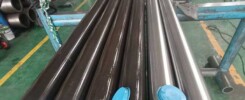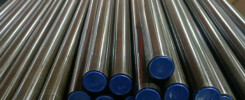ST52 Carbon Steel seamless pipes are widely used for their high strength and stable mechanical properties, making them essential in industries such as petrochemicals, construction, aerospace, and manufacturing. To enhance their performance and quality, annealing is a crucial heat treatment process. This process involves gradually heating the material to a specific temperature and then controlled cooling to refine the crystal structure and optimize mechanical properties.
The effectiveness of annealing depends on several key factors, including temperature, holding time, cooling method, furnace atmosphere, and loading technique. Below is a detailed analysis of the optimal annealing conditions for carbon steel seamless pipes.
Temperature Conditions
(1) Full Annealing
Process: The steel is heated 30–50°C above the critical temperature (Ac3) to ensure complete recrystallization.
Temperature Range:
For carbon steel with 0.3%–0.6% carbon, Ac3 is approximately 750–800°C, so full annealing is conducted at 800–850°C.
Purpose:
Eliminates structural defects.
Refines the grain structure.
Reduces hardness for improved machinability.
(2) Incomplete Annealing
Process: Heating the steel to a temperature between Ac1 and Ac3.
Temperature Range:
For hypoeutectoid carbon steel, Ac1 is around 727°C, so incomplete annealing is conducted at 740–770°C.
Purpose:
Softens the material while retaining strength and toughness.
Optimizes the internal structure for subsequent processing.
(3) Spheroidizing Annealing
Process: Applied to eutectoid and hypereutectoid carbon steels, where the goal is to transform cementite into spheroidal shapes.
Temperature Range:
Set at 20–30°C above Ac1 (e.g., for T10 steel (1.0% carbon), Ac1 ≈ 730°C, so annealing is conducted at 750–760°C).
Purpose:
Reduces hardness for easier machining.
Prepares the material for further heat treatment (e.g., quenching).
Holding Time
The holding time ensures that the microstructure transformation is uniform across the material. It varies based on:
Material composition
Wall thickness
Processing requirements
General Holding Time Guidelines:
Typically 2–4 hours to allow complete structural transformation and ensure uniform grain refinement.


